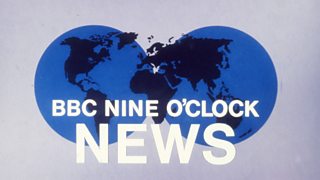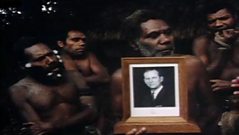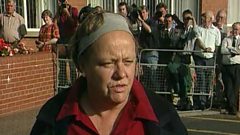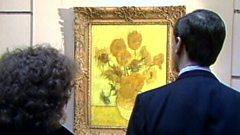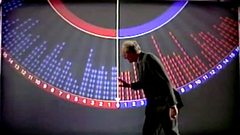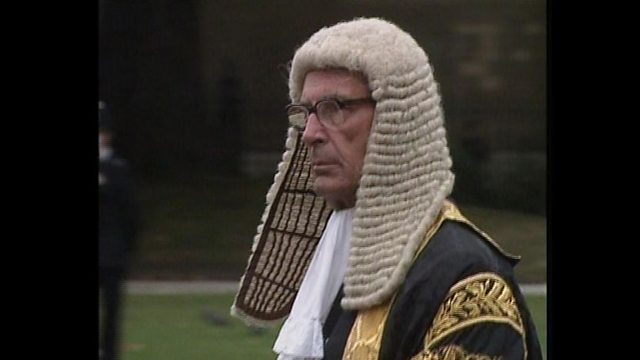
Maguire Seven case referred to Court of Appeal
The ‘Maguire Seven’, jailed for the Guildford and Woolwich pub bombings, are to have their case referred to the Court of Appeal by the 91�ȱ� Secretary, David Waddington.
Newsreader Philip Hayton announces that the 91�ȱ� Secretary David Waddington is expected to confirm later today that the case of the Maguire Seven will be referred back to the Court of Appeal so that their convictions can be quashed.
David Waddington has received Sir John May’s report on the judicial inquiry into the case. This is believed to be very critical of Lord Donaldson, the judge at the trial, and the forensic scientist on whose evidence the family were convicted.
Joshua Rozenberg’s report begins with archive shots of Sir John May and his colleagues taking their seats at the public inquiry. It continues with footage of the Master of the Rolls, Lord Donaldson, in full wig and regalia.
As Mr. Justice Donaldson he presided over the trial of the Maguire Seven in 1976. It is thought that the May Inquiry is likely to criticise Lord Donaldson for not giving sufficient weight in his summing up to evidence which undermined the reliability of tests by government scientists.
In 1977 the Court of Appeal had no criticism of how Mr. Justice Donaldson handled this point in his summing up. It is understood that the former appeal judges also come in for criticism in Sir John May’s report.
The Maguires’ solicitor, Alastair Logan, tells Rozenberg that there was a concerted effort to suppress information that would otherwise have resulted in acquittals. He feels that there was a great deal of pressure at the time on the police.
The report ends with footage of Anne Maguire walking briskly into a block of flats. Mrs Maguire makes no comment but Joshua Rozenberg concludes, “She’s wondering how quickly the Director of Public Prosecutions can come to court and say the words she’s waited 16 years to hear.”
CONTEXT
CONTEXT
On 5 October 1974 the Provisional Irish Republican Army (PIRA) targeted Guildford, Surrey, because it was situated close to a number of garrison towns. The PIRA planted two six-pound gelignite bombs in two pubs. The first exploded just before 9.00pm in the Horse and Groom, destroying the front of the building and shattering the windows of neighbouring shops.
It killed Paul Craig, a plasterer (22 years old); two members of the Scots Guards, William Forsyth (18) and John Hunter (17); and two members of the Women’s Royal Army Corps, Caroline Jean Slater (18) and Ann Ray Hamilton (19). A further sixty-five persons were wounded.
After the first explosion, other public houses were evacuated, including the Seven Stars where the second bomb exploded at approximately 9.35 p.m. without causing any serious injuries.
On November 7 1974 Gunner Richard Dunne, a soldier (42) and Alan Horsley, a sales clerk (20) were killed when a PIRA bomb exploded in the King’s Arms in Woolwich. Twenty-six people, including five soldiers, were injured.
In December 1974 the police arrested three men and a woman: Gerry Conlon, Paul Hill, Patrick Armstrong and Carole Richardson. In October 1975 these four were convicted of the Guildford and Woolwich bombings and given life sentences. The group was known as the Guildford Four.
On 4 March 1976 the Maguire Seven were convicted of making the explosives used in these bombings. The Maguire Seven were: - Anne Maguire, Patrick Maguire (Anne’s husband), Patrick Maguire (son of Anne and Patrick), Vincent Maguire (son of Anne and Patrick), Sean Smyth (brother of Anne), Patrick O’Neill (family friend) and Giuseppe Conlon (brother-in-law of Anne Maguire and father of Gerry Conlon).
Over the years, the cases of the Guildford Four and the Maguire Seven came under increasing legal scrutiny and the range of those seeking a review of the convictions extended widely. On 17 October 1989 it was announced that corruption proceedings would be taken against the police involved in the conviction of the Guildford Four. Two days later, with the exception of Paul Hill, those convicted for the bombings were released. This followed an announcement by the Director of Public Prosecutions that it would be wrong for the Crown ‘to seek to sustain’ the convictions of 1975 on the basis of confessions that they had later retracted. The Court of Appeal had decided that the DPP in 1975 had suppressed scientific evidence which conflicted with the confessions. Paul Hill remained in custody because he was implicated in a case that had not yet been resolved. His conviction was eventually quashed in April 1994.
On 26 June 1991 the Court of Appeal overturned the sentences on the Maguire Seven. All of them had completed their sentences. Afterwards many criticised the court for dismissing most of the grounds of appeal and had simply concluded that the hands of the convicted could have been innocently contaminated with nitro-glycerine.
Duration:
This clip is from
More clips from 91�ȱ� Nine O'Clock News
-
![]()
Worshipped in Vanuatu—24/06/1980
Duration: 01:02
-
![]()
Real IRA statement on Omagh bomb—18/08/1998
Duration: 02:39
-
![]()
Van Gogh Painting Auctioned for Record £25 million—30/03/1987
Duration: 02:41
-
![]()
Analysis of the 1997 Election—02/05/1997
Duration: 02:45
